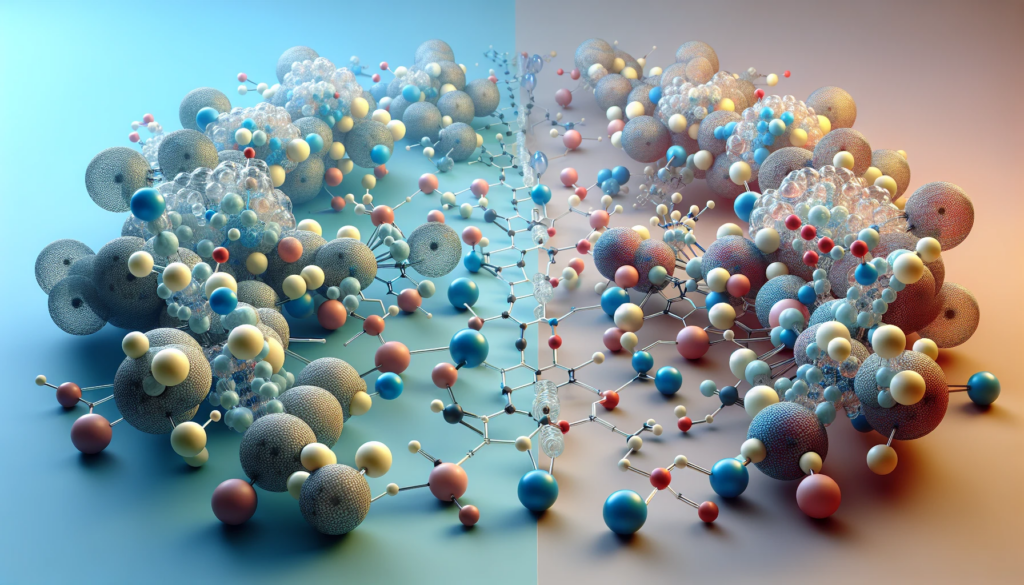Bioidentical Hormone vs Synthetic: Assessing Your Best Choice for Hormone Replacement Therapy
Hormone replacement therapy (HRT) is a widely-used form of treatment for those who suffer from hormonal imbalances and menopausal symptoms. Comparing bioidentical or natural hormones vs synthetic hormones requires knowledge about the benefits, risks, effects on the body, as well as expert opinions and administration methods to help inform decisions regarding one’s own journey with HRT. In this blog post readers will be provided with information necessary for making an educated choice between these two types of hormones that are used in hormone replacements – natural or ‘bioidentical’ versus synthetically made ones – so they can take control of their bodies accordingly.
Key Takeaways
- Testosterone is a steroid hormone that plays an important role in development, growth, sexual health and muscle/bone strength.
- Hormone production is regulated by the brain with normal ranges for males 300-1,000 ng/dL & females 15-70 ng/dL.
- Testosterone therapy can be beneficial but it’s necessary to understand potential side effects & precautions before undergoing treatment.
Understanding Bioidentical and Synthetic Hormones

Hormone therapy, also known as hormone replacement therapy (HRT), is utilized for treating menopausal symptoms and hormonal imbalances. Bioidentical hormones and synthetic ones are both involved in this process but differ when it comes to their molecular structure. Bioidentical hormones have an identical composition with those generated by the human body whereas artificial or lab-made compounds used in the synthetic form of HRT might not share that same chemical makeup. In bioidentical hormone treatment, commonly employed substances include estrogen, progesterone, testosterone while a synthetic variant of progesterone termed “progestins” may be prescribed instead within the latter kind of regime.
Various forms such as pills, creams gels sprays or vaginal inserts exist when it comes to doses needed for either type. FDA approved medicinals which undergo particular testing from governmental organizations can be purchased compared against compounded varieties requiring prescription by health professionals which don’t require additional inspections since they’re tailored to individual needs. Understanding what sets apart these types of treatments based upon naturally produced versus synthetically derived aspects should always be kept into consideration before any decision is taken regarding hormone replacement solutions.
The Pros and Cons of Bioidentical Hormone Replacement Therapy (BHRT)

Hormone replacement therapy that uses compounded bioidentical hormones is thought to be safer and more effective than synthetic hormone treatment. Proponents of BHRT suggest that it offers a natural, secure substitute for the artificial alternatives as they are indistinguishable from one’s own hormones at the molecular level. In spite of this, compounded forms should still be used with care because there could potentially be dangers linked with them according to recommendations made by FDA.
On the other hand, certain studies have suggested a connection between higher risk of breast cancer when taking synthetically manufactured progestins, which form part of typical artificial treatments for hormonal issues, while benefits or risks concerning both types – bioidentical and synthesized – must always be discussed firstly in detail together with an authorized medical expert before coming up with any conclusion about which type suits best each person’s particular needs better.
The Debate Over Synthetic Hormones: Benefits and Risks
Synthetic hormones have been used to treat menopausal symptoms and hormone imbalances. They are associated with potential health risks such as an elevated risk of breast cancer. Synthetic progestin may increase the likelihood of ovarian and endometrial cancers.
On the other hand, bioidentical hormones are safer and closely mimic natural body hormones due to their identical molecular structure, which allows them to be seamlessly integrated into our hormonal system, thus potentially causing fewer side effects when compared against synthetic ones.
Bioidentical vs Synthetic: Hormonal Effects on the Body

Bioidentical hormones, which are similar to natural bodily ones, seem to be more effective than synthetic forms. For instance, bioidentical synthetic progesterone has been proven as a preventive measure against breast cancer and also inhibits cell division in the breasts. Bioidentical estrogen is thought of having comparable benefits for women’s health just like other types of naturally-produced hormones do when it comes to menopause symptoms or hormonal imbalances.
On the contrary, artificially produced hormones may cause different effects because their molecular structure differs from that of their organic counterparts. They might not have the same compatibility with body receptors, which can bring about varying efficiency levels along with undesirable side effects compared to those generated by hormones produced by bioidenticals and synthetics altogether.
Safety Profile: Evaluating Long-Term Health Implications

Bioidentical hormones are thought to be safer than synthetic hormones, which have been linked with higher health risks. There may still be some risk associated with the long-term use of bioidenticals, such as an increased chance of venous thromboembolism and increased risk of endometrial cancer. Likewise, hormone replacement therapy (HRT) at a high dose could lead to a heightened threat for breast cancer.
Contrarily, studies propose that using bioidentical hormone treatment might decrease heart disease or mammary tumor hazard to artificial hormones. Thus demonstrating why many consider them more secure than their substitute counterparts overall.
Personalized Medicine: Customizing Your Hormone Therapy
Hormone therapy can be personalized for an individual’s needs by using bioidentical hormones. This method of treatment involves combining specific hormone doses, such as synthetic progesterone compound and, estrogen and testosterone, according to the person’s unique imbalances or requirements, which is done in a compounding pharmacy that ensures precise proportions are used.
In contrast to bioidenticals, synthetic hormones typically come in standardized dosages making them less effective depending on what the patient might need. It’s important to discuss different options available including both types of treatments with healthcare professionals before starting any course of action involving these medications.
Administration Methods: Patches, Pills, and Hormone Pellets
For those seeking hormone replacement therapy, various methods can be employed to supplement hormones the body may lack. Patches offer convenience and sustained release, but have limited dosage adjustments or risk patch displacement. Pills protect against diseases like osteoporosis, yet carry potential serious risks long-term. Hormone pellets are a subcutaneous implant that provides bioidentical hormones, making them an attractive choice for many with guidance from their healthcare provider being key in determining which route is best suited for individual needs.
Monitoring and Adjusting Treatment: The Role of Saliva Testing and Kinase Inhibitors
Hormone therapy is essential to obtaining optimal results with minimal side effects, and two key components in monitoring it are saliva testing and kinase inhibitors. Saliva tests can detect imbalances or deficiencies, measure hormone levels including that of estrogen present in the body non-invasively and accurately, as well as assess how effective treatment is. Kinase inhibitor medications combined with hormonal treatments offer an added level of support for cell cycle management along with survival rates. Tyrosine (TKIs) and cyclin dependent kinases (CDKs), are just some forms these come in. Healthcare professionals monitor any progress made through regular assessments according to test scores taken from patients plus feedback given by them for making adjustments if necessary – thus playing a critical role throughout this whole process.
Transitioning Between Therapies: What to Expect
It is essential for healthcare professionals to carefully supervise the process of changing between bioidentical and synthetic hormone therapies. The precise steps taken may differ depending on individual circumstances, so it’s important to get advice from an expert in this area who can determine a suitable approach. This might involve initiating treatment with lower dosages, which are then gradually increased over time until desired results have been achieved. People should not take too high doses as they attempt to speed up progress. Compliance with medical guidance is critical when shifting between these treatments.
Follow-up checks by professional caregivers must be regular in order that efficacy and safety while transitioning hormone therapy types can be properly managed. They will also aid any potential side effects encountered during natural hormone conversion could be kept under control if monitored appropriately making sure the transition runs smoothly & hassle free!
Expert Opinions: What Health Professionals Say About Bioidentical vs Synthetic Hormones
When it comes to hormone replacement, bioidentical hormones are a consideration as an alternative or in combination with synthetic hormones. While there is no definitive consensus amongst health professionals regarding which type of therapy works best for patients, endocrinologists have differing opinions on the effectiveness and risks associated with bioidenticals vs FDA-approved medications compounded hormones.
For this reason, individuals should seek out advice from their medical professional who can tailor information based on personal needs when discussing suitable options for replacing lost hormones within the body.
Summary
It is essential for anyone considering hormone replacement therapy to understand the differences between bioidentical and synthetic hormones. Bioidentical ones are believed to be safer and more effective than their synthetic counterparts, so it’s important to speak with a healthcare professional about which type of hormone treatment will best suit your individual needs based on potential benefits or risks as well as medical history.
Frequently Asked Questions
Why are some doctors against bioidentical hormones?
Due to lack of FDA approval and unknown long-term safety issues, major medical organizations oppose the use of bioidentical hormones. As such, doctors remain wary about using them due to their insufficient knowledge on potential side effects.
Why are bioidentical hormones not FDA-approved?
Bioidentical hormones cannot be FDA-approved as the Federal Drug Administration does not have enough data to assess their safety and effectiveness. These specific hormones are compounded drugs, which makes it difficult for the FDA to determine whether they meet necessary criteria of efficacy and security.
Which hormones are bioidentical?
Bioidentical hormone therapy (BHRT) is the use of plant-based hormones like estrogen, progesterone and testosterone, which are all premade by drug companies. This particular form of therapeutic intervention involves taking bioidentical hormones themselves, made to be similar in structure to those occurring naturally within the body.
What are examples of synthetic hormones?
Synthetic hormones, such as Premarin and Provera, which are assimilated by the body into a usable form synthetic testosterone, have been found in both surface water samples and drinking water. Other synthetic hormones employed medically include gestodene, norgestrel, levonorgestrel medrogestone, 17-ethynylestradiol and trimegestone.
Are bioidentical hormones always better than synthetic hormones?
When it comes to hormones, bioidentical ones may be preferable since they are thought of as safer and more effective than synthetic counterparts. To ensure the best outcome, one should consult a medical expert for what is most suitable when considering hormonal needs.
Call us at Philly Wellness Center to start your journey.
Call or Text +1 (215) 709-9710
Our Article
Ready to Transform Your Weight Loss Journey?
Unlock the Power of Semaglutide – Your Path to Effective and Sustainable Weight Loss.
Schedule AppointmentAny Question ?

834 South St Philadelphia, PA 19147
Open Hours Mon-Fri: 10 AM – 5 PM
215.709.9710
info@phillywellnesscenter.com